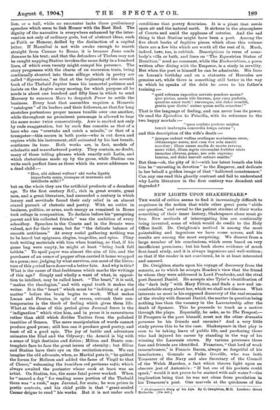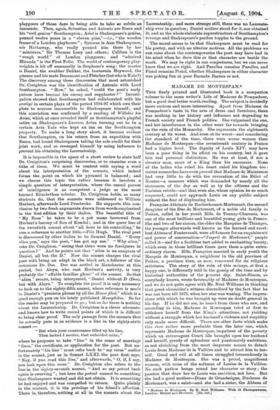THE world of critics seems to find it increasingly difficult
to acquiesce in the notion that while other great poets " abide our question," and reveal to the patient student of their works something of their inner history, Shakespeare alone must go free. New methods of interrogating him are continually being invented, some of which would do credit to the Holy Office itself. Dr. Creighton's method is among the most painstaking and ingenious we have come across, and his results are among the most surprising. We dissent from a large number of his conclusions, which seem based on very insufficient premisses ; but his book shows evidence of much first-hand study, and it is always ingenious and well-written; so that if the reader is not convinced, he is at least interested and amused.
Dr. Creighton starts upon his voyage of discovery from the sonnets, as to which he accepts Boaden's view that the friend to whom they were addressed is Lord Pembroke, and the rival poet Samuel Daniel. He accepts also Tyler's identification of the " dark lady " with Mary Fitton, and finds a new and un- comfortable story about her, which we shall not discuss. What interests us most is his supposed discovery of the real occasion of the rivalry with Samuel Daniel, the matter in question being nothing less than the vacancy in the Laureateship after the death of Spenser. This he proceeds to track as a motive through the plays. Especially, he asks, as to The Tempest,— If Prospero is the poet himself, must not the other dramatis personae be his friends and enemies ? And a very little study proves this to be the case. Shakespeare in that play is seen to be taking leave of public life, and pardoning those who had injured his career by standing in the way of his winning the Laureate crown. By various processes these foes and friends are identified. Francisco, " that lord of weak remembrance," is Francis Bacon, always so forgetful of his benefactors ; Gonzalo is Fulke Greville, who was both Treasurer of the Navy and also Secretary of the Council of the Welsh Marches, a fact which throws light upon an obscure jest of Antonio's : " If but one of his pockets could speak," would it not prove to be stained with salt water?—the implication being that he was not clean from peculation in his Treasurer's post. One marvels at the quickness of the * Shakespeare's Story of his Life. By C. Creighton, N.D. London: Grant Richards. [10s. net.] playgoers of those days in being able to take so subtle an innuendo. Then, again, Sebastian and Antonio are Essex and his "evil genius" Southampton ; Ariel is Shakespeare's geriius, penned twelve years in a " cloven pine,"—i.e., " the wooden frame of a London playhouse" ; Sycorax is Ann Shakespeare, rrhe. Hathaway, who really penned him there by her " ministers," Sir Thomas Lucy and others ; Caliban is the " rough world " of London playgoers ; and " admired Miranda " is the First Folio. The world of contemporary play- wrights is hit off summarily in Stephano's song : the master is Daniel, the swabber Dekker, the boatswain Heywood, the gunner and his mate Beaumont and Fletcher (but who is Kate?) The discovery among these discoveries that most astonished Dr. Creighton was the identification of Antonio with Lord Southampton. "How," he asked, "could the poet's early patron have become his enemy and supplanter ?" Investi- gation showed that Southampton had collaborated with his protegg in certain plays of the period 1594-97 which owe their plots to sources inaccessible to Shakespeare himself ; and this conviction was confirmed by a reading of Willobie his Avisa, which at once revealed itself as Southampton's playful satire on Shakespeare's Lucrece, Avisa turning out to be a certain Avis Tate who kept an inn on the Southampton property. To make a long story short, it became evident that Southampton, on his return from an expedition with Essex, had found Shakespeare taking the sole credit for their joint work, and so revenged himself by using influence to prevent his obtaining the Laureateship.
It is impossible in the space of a short review to state half Dr. Creighton's surprising discoveries, or to examine even a tithe of them. We must be content with saying a word about his interpretation of the sonnets, which indeed forms the point on which his pyramid is balanced ; and we choose this topic the rather because it involves a simple question of interpretation, where the casual person of intelligence is as competent a judge as the most learned Elizabethan scholar. Dr. Creighton holds, as many students do, that the sonnets were addressed to William Herbert, afterwards Lord Pembroke. He supports this con- clusion by two fresh arguments drawn from words emphasised in the first edition by their italics. The beautiful title of " My Rose " he takes to be a pet name borrowed from Herbert's barony of Ros of Kendal ; and in the queer line of the twentieth sonnet about "all hews in his controlling," he sees a reference to another title,—Fitz Hugh. The rival poet is discovered by other italics to be Samuel Daniel. "Every alien pen," says the poet, " has got my use." " Why alien," asks Dr. Creighton, " seeing that there were no foreigners in question ? " And he points out that " alien is an anagram of Daniel, all but the D." Now the sonnet charges the rival poet with being an adept in the black art, a follower of the notorious Dr. Dee. Dee was settled in Manchester at this period, but Aleyn, who cast Herbert's nativity, is very probably the " affable familiar ghost" of the sonnet. So that " alien " means, being interpreted, "Daniel without D (Dee), but with Aleyn." To complete the proof it is only necessary to look on to the eighty-fifth sonnet, where reference is made to Daniel's "precious phrase by all the Muses filed," which is a good enough pun on his lately published Musophilus. So far the reader may be prepared to go ; but so far there is nothing about the Laureateship. Dr. Creighton is a clever advocate, and knows how to write round points of which it is difficult to bring clear proof. The only passage from the sonnets that he actually puts in as evidence is a line in the eighty-sixth sonnet :—
" But when your countenance filled up his line, Then lacked I matter, that enfeebled mine;"
where he proposes to take " line " in the sense of marriage "lines," the certificate, or application for the post. But un- fortunately n his line " must refer back to " my verse " earlier in the sonnet, just as in Sonnet LXXI. the poet first says, " Nay, if you read this line," and afterwards, " 0, if, I say, you look upon this verse." Dr. Creighton also refers to the line in the eighty-seventh sonnet, " And so my patent back again is swerving " ; but here the patent cannot be something that Shakespeare wanted and did not obtain. It is something he had enjoyed and was compelled to return. Quite plainly in the context, it is the privilege of his friend's affection. There is, therefore, nothing at all in the sonnets about the
Laureateship ; and more strange still, there was no Laureate- ship ever in question; Daniel neither stood for it, nor obtained it, and so the whole elaborate superstructure of Southampton's revenge and Shakespeare's pardon topples to the ground.
The moral seems to be that Shakespeare must be read for his poetry, and with no ulterior motives. All the problems we can raise about the contemporaries the poet may have had in his mind when he drew this or that character are beside the mark. We may be right in our conjectures, but we can never know that we are right. And Percales remains Parolles, and Pistol remains Pistol, whether Shakespeare in either character was poking fun at poor Barnabe Barnes or not.







































 Previous page
Previous page